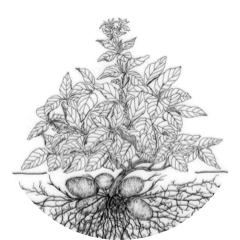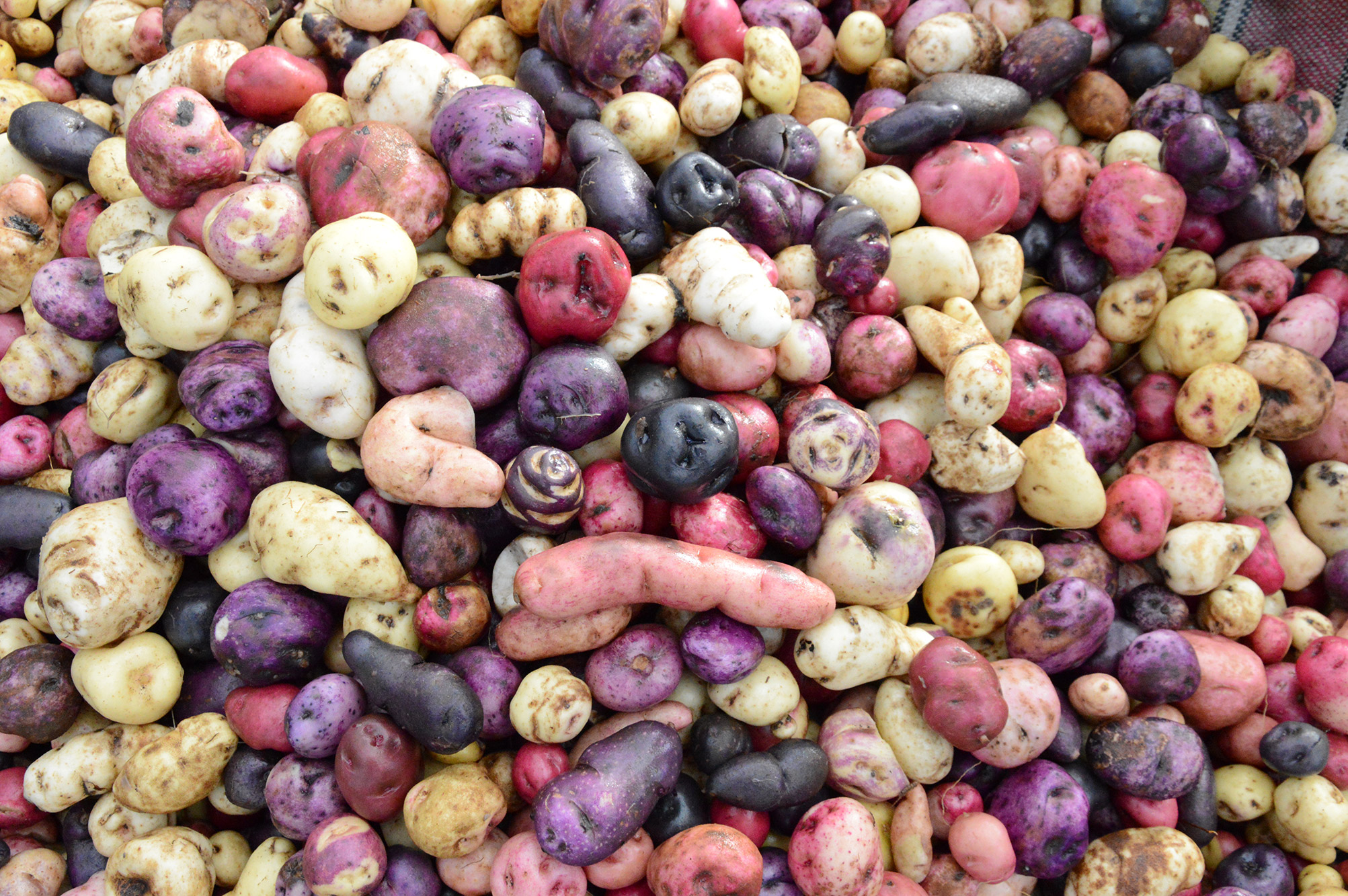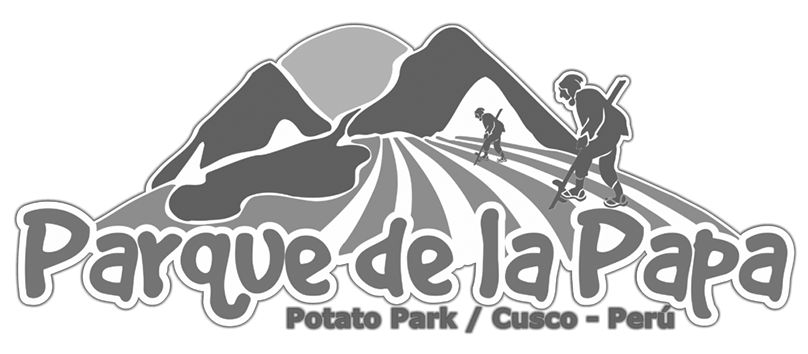
Tuberous Respect after Progress
Praising Verses and Potato Flourishing in the Andean Highlands
Since they first domesticated the potato some 8000 years ago, Andean people have worked to shape thousands of varieties differing in form, texture, colour and taste. Yet successive agricultural intensification campaigns since the second half of the past century, paired with increased access to the regional labour market, have reduced potato diversity in Andean fields. The poems presented in this digital exhibition tell the story of potato-human companionship in the Cuzco highlands (Peru), where 6 communities have gathered together in 2002 to create a Potato Park intended to revive a shrinking population of native potatoes after agricultural progress. Beside the conservation of agrobiodiversity, these cultivators work to raise potato respect (respeto, in Spanish). In these highland households, potatoes do not feature as food to be passively ingested; and rather as kin imbued with intentionality and affectivity.

These verses are declaimed by cultivators to cheer tubers up, and thereby sustain the composition of agricultural communities (ayllus) assembled through interspecies relatedness, more-than-human respect and ecological care. Besides, their public recitation on the National Potato Day proclaims highland dwellers’ entanglement with tubers - in a national context where a racist depiction of wretched Indianness was historically hinged upon a scorn for highland agriculture. As well as weaving potato-human relatedness in the ayllu, this tuberous aesthetic is intended as a cosmopolitical intervention reclaiming agricultural livelihood captured in the webs of capitalist exploitations.
Potato Poems
ANDES
Weaving Pluriversal Territories after Agricultural Progress
ANDES (Asociación para la Naturaleza y el Desarrollo Sostenible) is a non governmental organization promoting a conservation and sustainable development approach based on the Andean principle of sumaq kawsay (harmonious living) through the implementation of Biocultural Territories. ANDES works to strengthen local capacities and strategic responses to the socio-economic, cultural, ecological and political effects of the globalization process on local communities, as well as the protection of their resources, knowledge and the rights associated with these. Taking a decolonizing and emancipatory approach, ANDES established the Yachay Kuychi (Rainbow of Knowledge) Pluriversity, which acknowledges historical and ongoing colonialism, and seeks greater justice in the global food system. The Pluriversity initiative aims to address contemporary and future global challenges through bridging Indigenous ways of knowing and doing in agrobiodiversity and land use decision-making, policy, and practice.
In 2002, 6 Quechua communities in the district of Pisaq, Cuzco (Peru), with support from ANDES, created the Potato Park to collectively manage their communal land in defense of agricultural diversity. Located in the sacred valley of the Incas, the Park covers an area of 9280 hectares located between altitudes of 3400 and 4600 meters above sea level. It has more than 6,000 Indigenous inhabitants, who maintain some 1367 varieties of native potatoes. A team of eight local technicians and agricultural experts work on cultivation, experimentation, and conservation to strengthen the food sovereignty of farmers in the Andes, and contribute to worldwide food security. The Potato Park is not just a conservation initiative for various varieties of potatoes. It is, above all, a biocultural territory dedicated to the celebration of wild and cultivated species, the landscape and all its elements, including people, knowledge, traditions, innovations and the worldview of its inhabitants.
Following ancestral Andean cosmovision, ANDES conceptualises potato growing within relationships of reciprocity, or ayni, between human and other entities in the environment. Ayni is a Quechua word describing a longstanding relationship of reciprocity, as “ethical and spiritual norms that regulate all exchanges between people and their environment, promoting the preservation of the integrity of ecological processes, which in turn ensure energy flows and the availability of biodiversity and ecosystem goods and services.” (Pimbert and Argumedo, 2010: 343). The broader objective of the collaboration between ANDES and the Potato Park is to seek balance between runa ayllu (humans and domesticated entities), sallqa ayllu (wild entities) and the auki ayllu (spiritual entities) through reciprocal relations.
In order to foster relationships of ayni between humans and potatoes, ANDES and the Potato Park promote integrated agriculture, local gastronomy and biodiversity celebration. Ayni relationships also entail affective engagement manifested through respeto (respect). The Papa Huatay ceremony welcoming newly harvested potato before they are stored in the larder is a highlight of respeto enactment. Meaning “Potato Tying” in Quechua, the Papa Huatay is a domestic gathering intended to fasten tubers’ body and spirit together. It practically consists of coating piles of potatoes with straw and coiling lama wool rope around the heap. Beside the promotion of such domestic ceremony that today’s cultivators tend to omit, members of the Park have also realised Papa Huatay in public scenes as a plea for respectful agricultural practices. In 2004, one such ceremony was performed during a meeting at the National Council for the Environment in Lima when a delegation from the Park successfully lobbied the government to declare a national potato day. Every 30th of May the tuber has been nationally celebrated ever since. In the Park, hundreds of potato cultivators gather yearly to pay tribute to their potato with music, dances, feasting, agrodiversity exhibitions and indeed collective Papa Huatay. Building on Andean traditions of agricultural songs and dances, the organizers of Biocultural Festivals in the Potato Park enhanced the celebration with poetry contests, where cultivators of all generations are invited to recite verses in praise of their dear tuber. In 2021, ANDES’ directors Alejandro Argumedo and Tammy Stenner envisioned poetry recitations as a joyful and lively remedy against the devastation of the Corona Pandemic. Invitations were sent to the communities of the Park and 16 poets recorded and submitted their verses for consideration by the selection committee of 3 members of ANDES’ staff. Winners of the contest performed their poems during the 30th of May festivities in the community of Chawaytire. The potato poetry performances were previously recorded by the authors to feature in the AfterProgress exhibition.
Potato Respect
Cosmopolitical Verses After Agricultural Progress
Olivia Angé
Since they first domesticated the potato some 8000 years ago, Andean people have worked to shape thousands of varieties differing in form, texture, colour and taste. Conversely, this diversity contributes to the constitution of heterogeneous human bodies of highland cultivators who eat enough potato to consider themselves to be physically made of this tuber. Nourished by this bountiful crop, they spend daily efforts cultivating labour-intensive native varieties in the challenging ecologies of the Andean peaks. Yet successive agricultural intensification campaigns led by governmental and non-governmental institutions since the second half of the past century, paired with increased access to a regional labour market, have reduced agrobiodiversity in Andean fields. If the tuberous cornucopia remains impressive throughout the cordillera (Brush 2004, Zimmerer 1996), the array of varieties cultivated by every family has drastically declined as native potatoes are increasingly replaced by a few commercial ones, less laborious and better fit for market demand. Beside evicting the rich diversity necessary for composing balanced diet and coping with ecological vagaries, these so-called “improved” potatoes require the use of chemical pesticides and fertilisers with damaging consequences on soils, food and the ecology at large.
This poetry exhibition tells a story of potato-human companionship in the Cuzco highlands, where 6 communities have gathered together in 2002 to form the Parque de la Papa, Potato Park, intended to revive a shrinking population of native potatoes, after agricultural progress. In collaboration with ANDES, local potato experts work to make highland growers’ livelihood less “precarious” (Tsing 2015), in tune with Quechua notions of a good life, that is sumaj kausay. Their collaboration aims at the promotion of household economic autonomy, locally produced foods, and labour-intensive agriculture entailing multispecies complicities. Critical of the Western tales of progress and growth, they engage in transcultural dialogues for designing futures at the crossroads of diverse views on abundance, including scientific when relevant. While encouraging collaborations across human collectives, they importantly work for knitting relatedness beyond humans (Argumedo and Pimbert 2010), positing prosperity as a more-than-human endeavour which entails multispecies flourishing.
Besides the conservation of agrobiodiversity, these cultivators work to raise potato respect (respeto, in Spanish). An array of initiatives are undertaken to foster potato respect within the Park and beyond: from agronomic experiments or dances in plots, to the defence of native potato on national and international political scenes – notably against the introduction of GMOs. Their interspecies esteem aligns with Donna Haraway’s understanding of respect as respecere, a mutual regard bringing forth response-abilities (2008). In these highland households, potato does not feature as food to be passively ingested; and rather as kin imbued with intentionality and affectivity (Angé 2021). As cultivators warn us, an offended potato could decide to retaliate against them by curbing tuberous production. In this Andean agri-culture, tuberous kin are indeed given a chance to respond back to their human grower, notably by not producing food for them.
For the After Progress exhibition, we have translated into English verses written in Quechua by cultivators as an enactment of respect toward their potato companions. These are part of a rich corpus of Andean potato prose, in both Quechua and Aymara traditions (Arnold and Yapita 1996, Krögel 2012). Highland cultivators are not unique in writing potato poetry. Pablo Neruda’s Oda a la Papa and Seamus Heaney’s Digging are literary classics. In contrast with these latter, Andean growers’ poems are not addressed to human audiences only. They are foremost declaimed to cheer tubers up and thereby sustain their growth. The use of music as an agricultural practice fostering potato flourishing has been reported across the Andes (regarding Bolivian tubers, see Stobart 1996). Highlights of the Andean agricultural calendar entail work parties where musical performances, feasts and merry making enhance human labour and crop growing (Gose 1994). As generalised by Catherine Allen who participated in chuño (dried potato) ceremonies in Cuzco, music, song, and prayer “facilitate a flow of vitality among different categories of living beings” (2002: 147). This also is the purpose of the verses composed by the cultivators in the Potato Park. Their interspecies recitation entails a choreographic enactment broadcasting sound and bodily vibrations among human and vegetal bodies. The sensitive encounters brought forth by poetry are intended for circulating kusiska (joy) in the fields, producing thereby affective attunement across species divides. To convey their sensory and affective engagement, our contributors have appended their writing with an audiovisual account of their performances. Brought together in the exhibition, potato poems and choreographies are expected to bring forth a tuberous aesthetic fostering interspecies responsibility.
Henceforth, the verses at stake are meant to participate in the composition of agricultural communities assembled through interspecies relatedness, more-than-human respect and ecological care. As well as being an agricultural practice, poetry in the Park is intended as a political act proclaiming humans’ entanglement with tubers - in a national context where a racist depiction of wretched Indianness has been historically encapsulated in highland agriculture contempt (de la Cadena 2000). When potato poems are publicly enacted, as for instance during the potato national day, they are intended as political interventions calling for interspecies respect from a wide public of potato stakeholders, including those from the agroindustry, conservation institutions or political elites. Potato poetry was also recited to foster seeds respect when deposited in a gene bank. During a loving tribute to the 1500 native potatoes deposited in Svalbard Global Seed Vault by a Potato Park delegation, Brizaida Sicus from the community of Sacaca wrote and recited these verses to manifest her enduring relatedness to the seeds delivered for the sake of human food security:
- Mother Earth I offer you respect
- Sacred mountains I ask for your blessing
- To walk this journey bringing you endangered children
- Far away where the ice reigns
- To stay in a safe place.
- And now, arriving, I feel broken
- Because here I leave my family
- Alas! How will I leave my loved ones?
- When will I see you again?
- Don’t worry my family,
- We will return soon like the dawn
- And make sure you are smiling
- So my song will be joyful again
In an article exploring Andean potatoes’ itineraries between fields, kitchens and gene banks, Virginia Nazarea pointed the affective attachments and sensory memory created by this ceremonial song (2021: 265). In this historical moment captured by international media, interspecies poetry also triggered new tuberous engagements with the public at large by raising awareness of vegetal existences ignored by objectifying storage practices in gene bank. In this sense, potato verses also tell the story of poetry as a cosmopolitical act, where “cosmos refers to the unknown constituted by these multiple, divergent worlds and to the articulation of which they would eventually be capable” (Stengers 2005: 995, about Andean cosmopolitics see de la Cadena 2015). More than a linguistic exercise, cosmopolitical poetry is an interspecies performance reclaiming agricultural livelihood and liveliness captured by capitalism (Pignarre and Stengers 2005). This is another specificity of Andean potato poetry that this exhibition is committed to bring out.
Enmeshed in this wider initiative, potato poems outline an Andean design of multispecies flourishing, food production, and environmental justice severed from post-colonial injunctions to extractive progress. We are grateful to the convenors of the After Progress exhibition for hosting this loving and subversive interspecies poetry, thereby broadening its cosmopolitical diplomacy.
References
- Angé, Olivia. 2021. “Ecological Nostalgia and Interspecies Affect in the Highland Potato Fields of Cuzco (Peru),” in Olivia Angé and David Berliner (eds), Ecological Nostalgias, pp. 107-125. Oxford: Berghahn Books.
- Argumedo Alejandro and Michel Pimbert. 2010. “Bypassing Globalization: Barter Markets as a New Indigenous Economy in Peru”, Development 53 (3): 343-349.
- Arnold, Denise, and Juan de Dios Yapita, eds. 1996. Madre Melliza y Sus Crias Ispall Mama Wawampi. Antologia de la Papa. La Paz: Hisbol Ediciones
- Brush, Stephen. 2004. Farmers’ Bounty. Locating Crop Diversity in the Contemporary World. Ann Arbor: Sheridan Books.
- de la Cadena, Marisol. 2000. Indigenous Mestizos. The Politics of Race and Culture in Cuzco, Peru, 1919-1991. Durham and London: Duke University Press.
- de la Cadena, Marisol. 2015. Earth Beings. Ecologies of Practice Across Andean Worlds. Durham and London: Duke University Press.
- Gose, Peter. 1994. Deathly Waters and Hungry Mountains. Agrarian Ritual and Class Formation in an Andean Town. Toronto: University of Toronto Press.
- Haraway, Donna. 2008. When Species Meet. Minneapolis: University of Minnesota Press.
- Krögel, Alison. 2012. “‘Sara mamacha, papa mamacha’ : representaciones alimenticias en la poesia quechua,” Revista de Crítica Literaria Latinoamericana 38 (75): 331-361.
- Nazarea, Virginia. 2021. “Ontologies of Return. Terms of Endearment and entanglements,” in Terese Gagnon and Virginia Nazarea (eds), Moveable Gardens. Itineraries and Sanctuaries of Memory, pp. 253-272. Tucson: The University of Arizona Press.
- Pignarre, Philippe and Isabelle Stengers. 2007. La sorcellerie capitaliste : Pratiques de désenvoûtement. Paris : La Découverte.
- Stengers, Isabelle. 2005. “The Cosmopolitical Proposal,” in Making Things Public. Atmospheres of Democracy, in Bruno Latour and Peter Weibel (eds), pp. 994-1004. Cambridge: MIT Press.
- Stobart, Henry. 1994. “Flourishing Horns and Enchanted Tubers: Music and Potatoes in Highland Bolivia”, British Journal of Ethnomusicology 3: 35-48.
- Tsing, Anna. 2015. The Mushroom at the End of the World. On the Possibility of Life in Capitalist Ruins. Princeton: Princeton University Press.
Contributors
Poets
Vanessa Yupanqui Huaraka was born in the community of Paru Paru (district of Pisac, Cuzco). Now 18 years old, she studied at the Amauta College in Qello Qello. She currently sustains agricultural production, as well as alpaca and sheep breeding. Since she was a child, she loved her parents’ potato production, including chuño processing to cook her favourite meal: fried trout with chuño and potatoes.
Francisco Ccana Sotalero was born in the community of Amaru (district of Pisac, Cuzco). He is a 53-year-old cultivator, father of 6 children. He currently grows more than 50 varieties of native potatoes. Since he was a child, his father instructed him to identify the ancestors’ varieties, the kinds of soils in which they best grow and how to work with the chakitaqlla, a foot plow crucial for cultivation in plots with restricted access.
Jhon Cristhian Palomino was born in the community of Amaru (district of Pisac, Cuzco). He studied at the Qello Qello high school. His parents are cultivators. They taught him traditional agricultural knowledge; as well as respect for Mother Earth who year after year provides us with food. He likes to compose poems and Andean music.
Rodrigo Pacco was born in the community of Paru Paru (district of Pisac, Cuzco). He is 13 years old and proud that his parents taught him agriculture, and how to recognize native potato varieties. He likes helping them to prepare chuño, which is a core labor and sustenance for his family.
Vanesa Puma Pacco was born in the community of Paru Paru (district of Pisac, Cuzco). At 7 years old, she goes to school in her community. When she comes back home, she helps her parents to graze her sheep and alpacas. While walking, she likes singing, listening to surrounding birds and admiring the landscapes of her beautiful community.
Poems Translator
Aniceto Ccoyo Ccoyo was born in the community of Sacaca (district of Pisac, Cuzco). He is a 34 years old famer and technician in the Potato Park, who learned about potato growing from his father and grandfather. He is now committed to transmit his expertise on potato diversity to his two children and the young generation in his community. He loves music and plays an array of Andean instruments.
Festival Designers
Tammy Stenner shares her time between Ontario, Canada and Cuzco, Peru. At ANDES, she leads the Yachay Kuychi Pluriversity initiative, with the aim of bridging traditional knowledge systems with academic and scientific knowledge to address complex global problems including climate change, loss of biodiversity and inequality.
Alejandro is one of ANDES’ co-founders and director. He also is Director of Programs and Andes-Amazon Lead at the Swift Foundation. He has founded various networks of indigenous communities to promote biocultural heritage territories and the rights of indigenous peoples, including the Indigenous Peoples Biocultural Climate Change Assessment Initiative (IPCCA) and the International Network of Mountain Indigenous Peoples (INMIP).
Field Coordinator
Jessica Villacorta is an agronomic engineer who lives in Cuzco. She is currently working on native potato conservation as the Potato Park coordinator at ANDES. She enjoys collaborating with indigenous farmers who generously share their knowledge, making her part of their communities.
Web and Graphic Designer
Thierry de Crombrugghe is a web and graphic designer who lives in Waterloo (Belgium). With the Tuberosum Tuberosum that he grows in his garden, he cooks Hachis Parmentier and stoemp that rejoice his 5 children. He heads the Audio Visual Center of the Teaching Department at the Université Libre de Bruxelles.
Academic Designer
Olivia Angé lives in Waterloo, Belgium, where she only grows human children, no potato for the moment. However, she learned about Tuberosum Andigenum with experts from highland ayllus during her stays in the Potato Park since 2015. She is an associate professor of anthropology at the Université Libre de Bruxelles.
Gratitude
We are thankful to the Fonds National de la Recherche Scientifique for gracious funding under the Research Project Agrivalues (n°35282336).
We are thankful to the European Research Council for gracious funding under the Starting Grant SeedsValues (n°950220).
We are thankful to ANDES for logistical support and conceptualisation guidance.
We are thankful to the cultivators in the Potato Park for fostering interspecies respect at many different scales.
We are thankful to the curators of the AfterProgress Virtual Exposition for incentivising the design of flourishing futures and inviting the potato, and its respectful lovers to participate in this endeavour.
We are thankful to Lichtenegger Erwin, illustration creator. Wurzeldarstellungen, 2009 - Wageningen University & Research images.wur.nl

